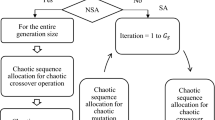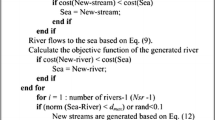Abstract
Genetic algorithms (GA) have been widely applied to solve water resources system optimization. With the increase of the complexity and the larger problem scale of water resources system, GAs are most frequently faced with the problems of premature convergence, slow iterations to reach the global optimal solution and getting stuck at a local optimum. A novel chaos genetic algorithm (CGA) based on the chaos optimization algorithm (COA) and genetic algorithm (GA), which makes use of the ergodicity and internal randomness of chaos iterations, is presented to overcome premature local optimum and increase the convergence speed of genetic algorithm. CGA integrates powerful global searching capability of the GA with that of powerful local searching capability of the COA. Two measures are adopted in order to improve the performance of the GA. The first one is the adoption of chaos optimization of the initialization to improve species quality and to maintain the population diversity. The second is the utilization of annealing chaotic mutation operation to replace standard mutation operator in order to avoid the search being trapped in local optimum. The Rosenbrock function and Schaffer function, which are complex and global optimum functions and often used as benchmarks for contemporary optimization algorithms for GAs and Evolutionary computation, are first employed to examine the performance of the GA and CGA. The test results indicate that CGA can improve convergence speed and solution accuracy. Furthermore, the developed model is applied for the monthly operation of a hydropower reservoir with a series of monthly inflow of 38 years. The results show that the long term average annual energy based CGA is the best and its convergent speed not only is faster than dynamic programming largely, but also overpasses the standard GA. Thus, the proposed approach is feasible and effective in optimal operations of complex reservoir systems.
Similar content being viewed by others
References
Ahmed JA, Sarma AK (2005) Genetic Algorithm for optimal operating policy of a multipurpose reservoir. Water Resour Manag 19(2):145–161
Chang L-C, Chang F-J (2001) Intelligent control for modeling of real time reservoir operation. Hydrol Process 15(9):1621–1634
Chang F-J, Lai J-S, Kao L-S (2003) Optimization of operation rule curves and flushing schedule in a reservoir. Hydrol Process 17(8):1623–1640
Chang J-X, Huang Q, Wang Y-M (2005a) Genetic algorithms for optimal reservoir dispatching. Water Resour Manag 19(4):321–331
Chang F-J, Chen L, Chang L-C (2005b) Optimizing the reservoir operating rule curves by genetic algorithms. Hydrol Process 19(11):2277–2289
Chau KW, Albermani F (2003) Knowledge-based system on optimum design of liquid retaining structures with genetic algorithms. J Struct Engi ASCE 129(10):1312–1321
Cheng C-T, Ou C-P, Chau KW (2002) Combining a fuzzy optimal model with a genetic algorithm to solve multiobjective rainfall-runoff model calibration. J Hydrol 268(1–4):72–86
Cheng C-T, Wu X-Y, Chau KW (2005) Multiple criteria rainfall-runoff model calibration using a parallel genetic algorithm in a cluster of computer. Hydrol Sci J 50(6):1069–1088
Cheng C-T, Zhao M-Y, Chau KW, Wu X-Y (2006). Using Genetic Algorithm and TOPSIS for xinanjing model calibration with a single procedure. J Hydrol 316(1–4):129–140
Goldberg DE (1989) Genetic algorithm in search, optimization and machine learning. Addison-Wesley Publishing Co., Inc., Reading, MA
Labadie JW (2004) Optimal operation of multireservoir systems: State-of-the-art review. J Water Resour Plan Manage 130(2):93–111
Li B, Jiang W-S (1998) Optimizing complex functions by chaos search. Cybern Syst 29(4):409–419
Liao G-C (2006) Hybrid chaos search genetic algorithm and meta-heuristics method for short-term load forecasting. Electr Eng 88(3):265–276
Lü Q-Z, Shen G-L, Yu R-Q (2003) A chaotic approach to maintain the population diversity of genetic algorithm in network training. Computational Biology and Chemistry 27(3):363–371
May RM (1976) Simple mathematical models with very complicated dynamics. Nature 261:459–467
Oliveira R, Loucks DP (1997) Operating rules for multireservoir systems. Water Resour Res 33(4):839–852
Ohya M (1998) Complexities and their applications to characterization of chaos. Int J Theor Phys 37(1):495–505
Reis LFR, Walters GA, Savic D, Chaudhry FH (2005) Multi-reservoir operation planning using hybrid genetic algorithm and linear programming (GA-LP): An alternative stochastic approach. Water Resour Manag 19(6):831–848
Rosenbrock HH (1960) An automatic method for finding the greatest or least value of a function. Comput J 3:175–184
Sharif M, Wardlaw R (2000) Multireservoir systems optimization using genetic algorithm: Case study. J Comput Civ Eng 14(4):255–263
Siarry P, Petrowski A, Bessaou M (2002) A multipopulation genetic algorithm aimed at multimodal optimization. Adv Eng Softw 33(4):207–213
Wardlaw R, Sharif M (1999) Evaluation of genetic algorithms for optimal reservoir system operation. J Water Resour Plan Manage 125(1):25–33
Wang Z, Zhang T, Wang H (1999) Simulated annealing algorithm based on chaotic variable. Control and Decision 14(4):381–384
Wurbs RA (1993) Reservoir-system simulation and optimization models. J Water Resour Plan Manage 119(4):455–472
Yeh WW-G (1985) Reservoir management and operation models: a state-of-the-art review. Water Resour Res 21(12):1797-1818
Wei G (2004) Fast immunized evolutionary programming. Evolutionary Computation 2004, CEC2004, Congress, 666–670
Yan X, Chen D, Hu S (2003) Chaos-genetic algorithms for optimizing the operating conditions based on RBF-PLS model. Comput Chem Eng 27(10):1393–1404
Yuan X, Yuan Y, Zhang Y (2002) A hybrid chaotic genetic algorithm for short-term hydro system scheduling. Math Comput Simul 59(4):319–327
Author information
Authors and Affiliations
Corresponding author
Rights and permissions
About this article
Cite this article
Cheng, CT., Wang, WC., Xu, DM. et al. Optimizing Hydropower Reservoir Operation Using Hybrid Genetic Algorithm and Chaos. Water Resour Manage 22, 895–909 (2008). https://doi.org/10.1007/s11269-007-9200-1
Received:
Accepted:
Published:
Issue Date:
DOI: https://doi.org/10.1007/s11269-007-9200-1




